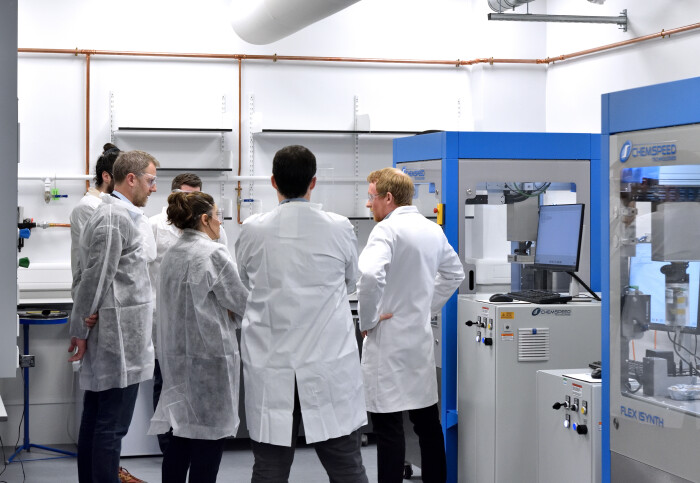Imperial launches new groundbreaking automation facility
by Sara West

The facility will accelerate advances in molecular systems for use in pharmaceuticals, sustainable polymers and clean energy materials.
On Thursday 20 April the new automated high-throughput platform suite (ATLAS) launched at Imperial College London. The event featured a series of talks from key figures in academia and industry on advances in high-throughput automation, and the synergies between high throughput experimental and computational work. The program covered research in new medicines, sustainable polymers manufacturing and clean energy materials, the three main areas which research at ATLAS will address.
Supported by a £1.3M EPSRC strategic equipment grant, ATLAS features three Chemspeed Technologies automated synthesis platforms which will support all stages of materials discovery including synthesis, process development, formulation optimisation and sample preparation. The synthesis platforms are intrinsically flexible, and designed to cater to a wide range of synthesis conditions applicable to experimentation across multiple research fields. It also houses a series of analytical instruments, fitted with autosamplers or plate readers, to allow fast paced characterisation of the materials.
"We are excited to launch this new facility and look forward to initiating new collaborations and projects". Professor Camille Petit Department of Chemical Engineering
ATLAS is a community resource, providing researchers from academia and industry with the tools and expertise to boost innovation in addressing their research challenges. A core principle is to promote accessibility to automated high-throughput equipment, and as such it offers support to researchers with no experience in such experimentation tools.
ATLAS both sits within and builds upon a family of automation and AI initiatives at Imperial, which was reflected in the opening session of the launch event.Professor Julie McCann, Vice-Dean (Research) for the Faculty of Engineering, opened the event by setting out Imperial College London’s research mission and academic strategy. Following this, directors and co-investigators from Imperial cross-faculty initiatives, including DigiFAB, Imperial-X, ROAR and DIGIBAT, shared the vision and successes of a common research ecosystem of automation, data and modelling in which ATLAS will play a key role.
Following sessions focused on High-throughput computational work for molecular systems discovery and design, clean energy materials, sustainable polymers and new medicines.
 Guests were also invited on guided tours of the new facility.
Guests were also invited on guided tours of the new facility.
The launch of ATLAS cements Imperial’s position as a UK leader in the field and a growing hub for world-class automated high-throughput research.
Professor Camille Petit, co-investigator for ATLAS, said: “We are excited to launch this new facility and look forward to initiating new collaborations and projects that will benefit from such experimental tools and accelerate the discovery and development of molecular systems”.
Dr Lana Lee, facility manager for ATLAS, said: “ATLAS is in a unique position, housing instruments to address research challenges across a broad range of fields. We’re excited to apply our tools and expertise, working with researchers to deliver diverse, globally critical research.”
Article text (excluding photos or graphics) © Imperial College London.
Photos and graphics subject to third party copyright used with permission or © Imperial College London.
Reporter
Sara West
Communications Division